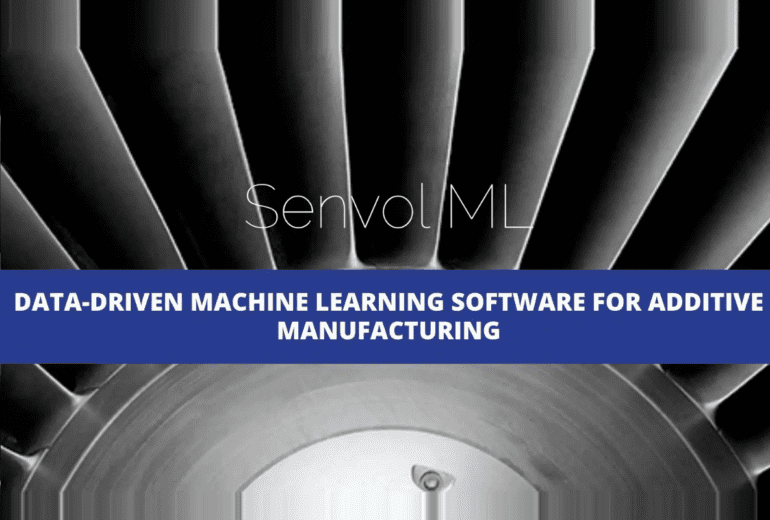TL;DR:
- Senvol, a database management company, introduces a machine learning approach to material allowables development.
- The machine learning technique proves to be more flexible, cost-effective, and time-efficient compared to conventional methods.
- Senvol ML software enables the rapid development of material property allowables for additive manufacturing (AM).
- Collaboration with partners EWI and Pilgrim Consulting, along with technical advisors, enhances the program’s success.
- The machine learning approach adapts to changes in the AM process, making it suitable for long-term sustainment.
- The program demonstrates its effectiveness using a powder bed fusion AM machine and 17-4 PH Stainless Steel material.
- Material allowables development is currently an expensive and time-consuming process.
- Senvol’s machine learning-based approach offers significant advancements in AM allowables development.
- The software supports AM process qualification and generates statistically substantiated material properties.
- More research is needed, but the potential benefits of machine learning in material allowables development are substantial.
Main AI News:
In a groundbreaking move, Senvol, a leading database management company headquartered in New York, has recently showcased a cutting-edge machine learning approach to material allowables development. This innovative technique has proven to be more flexible, cost-effective, and time-efficient compared to the conventional method known as Metallic Materials Properties Development Standardization (MMPDS).
The remarkable achievement was made possible through Senvol’s machine learning software, Senvol ML, which was applied as part of a prestigious US Government contract W911NF-20-9-0009. The objective was to facilitate the rapid development of material property allowables for additive manufacturing (AM).
To accomplish this ambitious goal, Senvol collaborated with esteemed partners including EWI and Pilgrim Consulting. Furthermore, the program benefited from the expertise of technical advisors such as Hector Sandoval, a Battelle and Lockheed Martin Fellow. The National Center for Manufacturing Sciences (NCMS) oversaw the administration of the contract via the AMMP Other Transaction Agreement (OTA) program.
The machine learning approach employed by Senvol proved to be remarkably versatile, capable of accommodating any changes in the AM process. This adaptability positions the approach as an ideal solution for long-term sustainment. The program’s focus centered around the utilization of a powder bed fusion AM machine to process a 17-4 PH Stainless Steel material.
“Material allowables development is a very expensive and time-consuming endeavor,” emphasized Annie Wang, President of Senvol. “Senvol’s program was tremendously successful in demonstrating a novel approach to additive manufacturing allowables development, harnessing the power of machine learning. We were extremely pleased with the results and eagerly anticipate continued advancements in this pioneering field.”
The exorbitant costs associated with allowables development can largely be attributed to the generation of vast amounts of empirical data at a fixed processing point. Regrettably, this means that each time a major change occurs in the process, all of the empirical data must be painstakingly regenerated from scratch. Consequently, the AM process becomes not only prohibitively costly and time-consuming during initial implementation but also burdensome to maintain in the long run, given the inevitable modifications to the AM process.
Hector Sandoval, who meticulously evaluated the AMMP program’s technical approach and test results, commented, “I possess extensive experience in developing material allowables using traditional methodologies. The current process functions adequately, but it has limitations. It was truly exhilarating to contribute to the AMMP program by reviewing the technical approach, test results, and final presentation. Witnessing the potential of leveraging a machine learning-based approach to establish material allowables firsthand was truly inspiring.“
Senvol’s ML software served as a critical tool for qualifying AM processes and was instrumental in the program’s development of statistically substantiated material properties akin to material allowables. Moreover, the software optimizes data generation requirements while maintaining its remarkable versatility, applicable to any AM process, machine, or material. It is important to note that, due to budgetary and programmatic constraints, this project did not yield authentic allowables. However, the groundwork has been laid for future advancements.
“The adoption of machine learning in the additive manufacturing process and material development has reached a mature stage. It has been embraced by the industry and represents the low-hanging fruit. Nonetheless, the specific use of machine learning for material allowables development remains a work in progress. We are delighted to have successfully demonstrated the machine learning approach to allowables on two occasions: once in this program, utilizing a metal alloy and comparing it to MMPDS, and previously in a program funded by America Makes, which employed a polymer material and compared it to CMH-17. However, further research is necessary. The potential benefits are immense, and we eagerly anticipate continued collaboration with the government and industry to advance this exciting field,” affirmed Zach Simkin, President of Senvol.
Dr. William E. Frazier, a renowned figure in the field, added, “I am honored to have joined Senvol’s team for this program. Senvol’s machine learning-enabled approach directly addresses a significant industry challenge: the rapid and cost-effective development of additive manufacturing material property allowables. Throughout my involvement in qualifying various additive manufacturing processes and materials for flight applications, it is clear to me that further development of this technology will yield positive impacts on the cost, schedule, and performance of both defense and commercial platforms.” Dr. Frazier, retired Chief Scientist for Air Vehicle Engineer at NAVAIR, is currently the President of Pilgrim Consulting LLC.
Conclusion:
Senvol’s introduction of machine learning for AM material allowables development represents a significant breakthrough in the market. This innovative approach offers enhanced flexibility, cost-effectiveness, and time efficiency compared to traditional methods. By leveraging machine learning, Senvol addresses the challenges of expensive and time-consuming allowables development, paving the way for a future of streamlined AM processes. This development has the potential to revolutionize the industry, benefiting both defense and commercial platforms by reducing costs, improving schedules, and enhancing performance. Continued collaboration between Senvol, the government, and industry stakeholders will be instrumental in advancing this technology and unlocking its immense potential.

